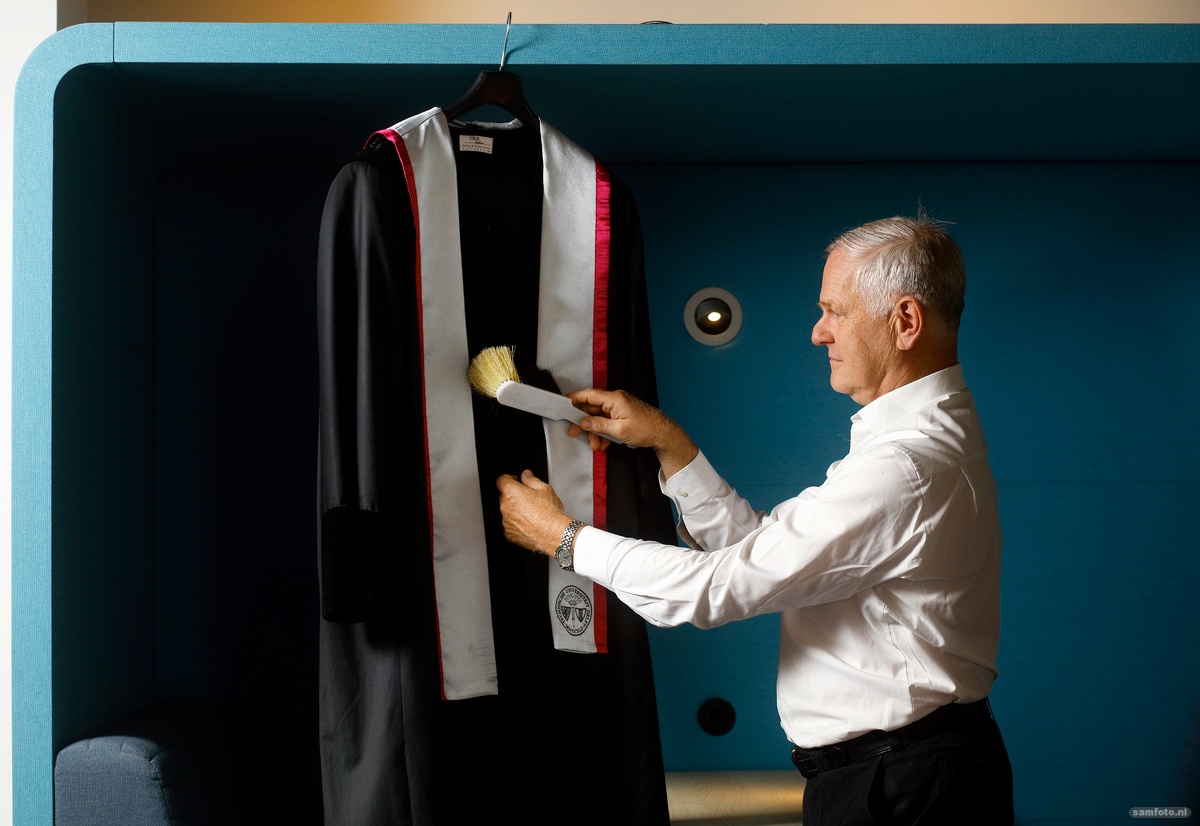On the day of the Opening of the Academic Year, Professor Kees Vuik (EEMCS) was awarded the Professor of Excellence award. Delta asked him the five secrets of his success.
Professor Kees Vuik preparing for the celebration. (Photo: Sam Rentmeester)
The entrance to the Electrical Engineering, Mathematics and Computer Sciences (EEMCS) tower feels like a building site. You have to pass through steel containers to reach the entrance. But on the third floor, peace reigns, and there is even a new carpet. The first room on the right is the new workplace of Kees Vuik (63), Professor of Numerical Mathematics and High Performance Computing.
He was presented the Professor of Excellence award on the morning of the Opening of the Academic Year on 5 September 2022: a net sum of EUR 15,000, two KLM business class tickets, a silver medal, and a certificate from the Delft University Fund. The prize is awarded annually to a professor who ‘through the quality of his/her teaching and research and its impact on the environment of students and PhD candidates excels’ (quote from the website).
“I am very happy with it, it is a great honour”, says Vuik. “I think it’s a beautiful and important award at TU Delft and in the Netherlands, that has prestige.” And then with a smile, “I see from the reactions on LinkedIn that I am now a well-known Dutchman at TU Delft.”
Delta asked the master of learning for five tips for colleagues.
Tip 1: See the person behind the student
“Look beyond the outside. See the person behind the student, because there is a lot of difference between individuals. It starts with interest, which of course is difficult in large lectures. But in tutorials and one-on-one contact, listen carefully to what people say, observe their body language. And another thing, be approachable, keep the door open as much as possible, and answer emails on time. It is easy to misjudge people. Some students pass all their courses with flying colours, but suddenly find it difficult to do a project or graduate. And it happens the other way round too: people who barely pass their courses suddenly score two publications when they graduate.”
Tip 2: Don’t mistake prior knowledge
“Empathise with the student. If you design and teach courses, be realistic and understand that students do not have all the previous lectures at hand. The first time, you are surprised that they don’t remember things. I make a note of it so that the following year I will remember that they don’t know it. I then ask a question along the lines of ‘this has already been covered, who still remembers it?’. Or I write a summary on another board and say: you should have known this.”
Tip 3: Keep innovating in your teaching
“Teaching is very important. Both the one-to-one guidance and the lectures. I believe it’s important to keep updating your teaching. It doesn’t necessarily have to be the subject matter, but once that is finalised, you can update how you teach it. Take the first-year ‘Modelling’ subject, for example. It involves a lot of practical work with an introductory lecture. I used to give the introductory lecture, but after three weeks the students had forgotten it. My colleagues and I converted the lecture into an online MOOC version. It has become a collection of small video clips, an assignment, and an exercise that they can work through at their own pace. This works a lot better. They now never ask how they can programme it as they have seen the bit about Python.”
Tip 4: Education comes first
“I believe that at universities, education should always come before research. Education and research are enormously intertwined and connected. But if there are any problems with deadlines, for me, education comes first. I have wanted to be an educator ever since I was a child, so my heart is in it. But I also think that a university is an educational institution. In order to provide good education, we need to do good research, but I find it difficult if people only want to do research. Then I think go and work at Deltares or TNO, then you can do research all day long.”
Tip 5: Put your own subject in perspective
“I sometimes see students or lecturers who get blinded, who think that their subject or research is the most important thing in the world. I know it is important that they know numerical mathematics, but I also find it important that they have social skills. I am in favour of degree programmes with a T-profile: a broad education with a specialisation that goes into depth. But you have to be realistic as you don’t know what people will need in practice. That depends on where they end up, be it in finance or a professorship. You may think your own subject is very important, but not everyone will benefit from it.”
- Kees Vuik has worked at TU Delft since 1988 and was appointed Professor in 2007. He estimates that he has taught 200 graduates and 45 PhD students, 10 of whom are still in the process of obtaining their degrees.
Do you have a question or comment about this article?
j.w.wassink@tudelft.nl


Comments are closed.